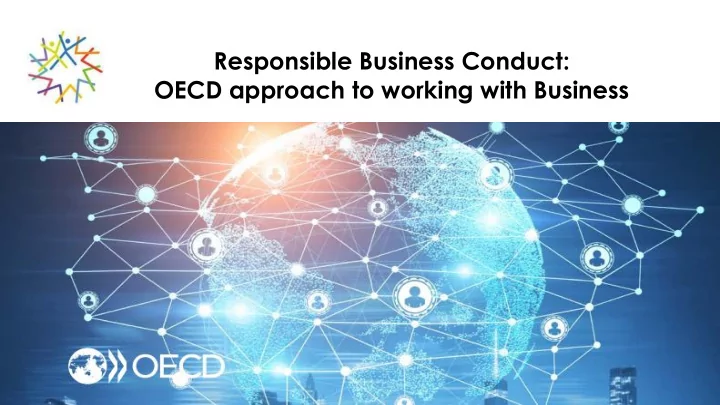

Responsible Business Conduct: OECD approach to working with Business
OECD Better policies for better lives 37 €575 Million Budget (2017)
Responsible Business Conduct Moves away from traditional vision of CSR • – Goes beyond philanthropy or voluntary action… – but also beyond “just” complying with law. Focuses on company impact – both positive and negative • – Ensuring a positive contribution to development while avoiding and addressing negative impacts Part of core business and risk management , including in the • supply chain and business relationships Risk-based due diligence approach • Applies to all businesses , not just large multinationals •
Pressures Companies are seeing an unprecedented increase in: • Legislation for disclosure of RBC activity (both new law and strengthening existing law) • Lawsuits for human rights and environmental issues • Investor and shareholder requirements on companies to adopt and report on RBC • Consumer action, both individuals and collective action, through social media and ‘mega’ campaign groups • Public benchmarking on RBC, supported by investors • Scrutiny from governments on supply chain activities
Benefits • Reduce risks and manage reputation • Facilitate participation in global value chains – meet customer expectations and international expectations • Obtain and retain the social license to operate • Protect existing value and create new value • Increase productivity and distinguish from competitors
OECD and businesses OECD has mandate to help companies meet increasing • societal expectations of responsible business conduct A big focus is on preventing and addressing negative • impacts in companies’ supply chains via risk-based supply chain due diligence Supported by implementation tools developed at OECD: • analysis, discussion, training exchange of expertise OECD also convenes experts and creates multi- • stakeholders platforms for companies to discuss and address common challenges 6
Risks in global seafood supply chains • Labour rights and human rights • Growing concerns on the worst forms of child labour • Significant women’s workforce in the processing sector • Working conditions and living wage • Lack of independent trade unions • Food safety and public health issues • Misuse of antimicrobials • Food fraud • Pressure on the environment • Pollutions • Climate change
OECD Guidelines for Multinational Enterprises • Comprehensive International standard on responsible business conduct • Recommendations from governments to businesses • Endorsed by business, trade unions and civil society • Can be used by all businesses – not just large enterprises Incorporates expectation of supply • chain due diligence
Alignment Internationally UN Guiding Principles on Business and Human Rights ILO Tripartite Declaration of Principles concerning Multinational Enterprises and Social Policy + environmental, anti-bribery, corporate governance, conventions and instruments Implementation: Due Diligence
What is due diligence? • Process through which companies can identify, prevent, mitigate and account for how they address their actual and potential adverse impacts - KNOW and SHOW • Impacts considered should go beyond internal financial or commercial impacts to the enterprise itself – focus on people, the environment, and society • Common framework for the entire supply chain
OECD Due Diligence FRAMEWORK
Responsible Supply Chains in Asia Project • Six countries: China, Japan, Myanmar, Philippines, Thailand, Vietnam • Work directly with businesses to European Union promote responsible supply chains through implementing due diligence standards and processes • Target sector for Viet Nam: Seafood and Textiles • Funded by the EU – OECD and ILO as implementation partners
Programme Components RESARCH POLICY CAPACITY AWARENESS • Research and • Dialogues to • Translations and • Promotional analysis on RBC encourage adaptation of conferences policy experience due diligence • Translation of landscape sharing and tools key materials in peer learning • In-depth analysis • Workshops local languages of existing RBC • Development of • Cross-sectoral • Targeted practices by practical and cross- seminars for companies in resource country business target sectors materials on key experience RBC topics • Research and sharing new data on • Thematic • Pilot projects in supply chains analysis of how agriculture and RBC policies are garment and integrated in footwear sector other policies
OECD activities with business in Viet Nam • Pilot project on implementing due diligence in Agriculture and Seafood – • Myanmar, Philippines, Thailand and Viet Nam • Looking for participants • Learn how to implement due diligence • Launch in June 2019 • Train the Trainer • Local organizations trained in OECD due diligence by OECD experts • Modules and training kits provided • Start in Q4 2019
Thank you shivani.kannabhiran@oecd.org With funding by the European Union
Recommend
More recommend